Six Years of War in Yemen: Children’s stories of courage and determination
The children of Yemen are resilient. For the past 6 years, they have experienced extreme violence and have grown up with bombings, injuries, destruction of their homes and schools, starvation and death. Despite all of this, they remain hopeful. With the help of our supporters, these children are encouraged and look towards a brighter future.
Meet 6 Yemeni children, who share their stories of loss and sadness but also of resilience and determination to rebuild their lives. (Photos by Anna Pantelia)
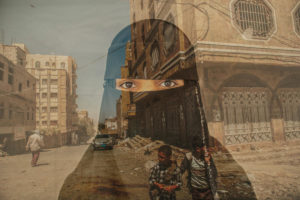
16 year old Falak* grew up very poor with her grandparents in Taiz, relying on food assistance from charities. She registered in a Save the Children vocational training, learning to sew. Soon after she began working as seamstress and was able to support her family.
Falak said “This training that I got from Save the Children is not just about sewing. They helped us understand the importance of keeping our dignity, being independent, being resilient and gave us guidance on how to protect ourselves. When the war first started I was afraid of the shelling. Now I know that I cannot control it, so I learnt how to live with it. I hope one day Yemen will be safe for everyone and I hope I will continue being independent so my family will not have to depend on anyone.”
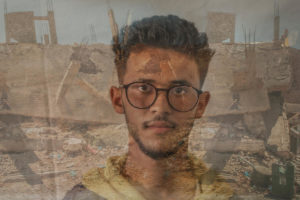
Musa said “Before the war life was calm. One day while I was in the market I heard clashes. I was going back home when a shell hit the neighbourhood. I fell on the ground unconscious. When I opened my eyes I was covered in blood. I stood up and I asked some young men who were nearby to take me to the hospital. I was only 10 when this happened. I am not afraid of the war anymore, I learn to live with it. My hope for the future is to settle down, have my own house and get married.”
15 year old Musa* was injured by a bombing in his neighbourhood. His family decided to flee their home to seek safety, leaving behind many things, including his school diplomas. Without having his diplomas, he was not able to be in school. Musa eventually enrolled in Save the Children vocational training, learning Mobile maintenance.
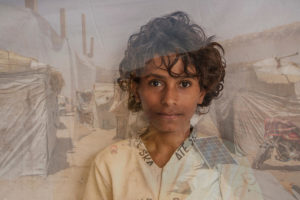
14 year old Sadam* watched his father die right before his eyes, during an airstrike. The airstrike also left Sadam’s leg severely injured. Despite an operation, he was not able to walk on his own. He was provided with much needed mental health support and another surgery for his leg.
“When the war started, my life was not the same. One day I was in the market with my father and I heard planes flying above us while we were walking back home. An airstrike hit the area we were. My dad died instantly and I was injured in the leg. When I grow up, I want to become a doctor so I can help people who are sick and injured. I hope Yemen will become as it was before the war” said Sadam.
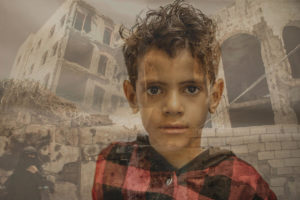
Omar* and his family of five, used to live in Taiz but when the war started, the moved around a lot in order to seek safety. Just this past February, Omar and his older brother were outside, when an artillery shell hit their neighbourhood. The two boys were immediately sent to the hospital, where Omar’s brother was pronounced dead. Omar was suffering from injuries in both legs. Save the Children supported the operation he required on his legs and also fully covered all medical expenses including follow ups, medication and specialized psychological support. Though he will heal from his leg injuries, the emotional toll of losing a sibling and experiencing the violent trauma will likely last longer.
Omar said “We were at school when we heard explosions. We ran inside the school and when they finished we went out again to play. One of my friends got injured in one of the explosions. I was on my way home with a friend and I wanted to go to find my brother when the artillery shell hit us. I was paralyzed for a moment. I was looking for my brother but I saw an old man on the ground. Then someone on a motorbike picked me up and took me to the hospital; I want toys to be able to play but I don’t want any shelling.”
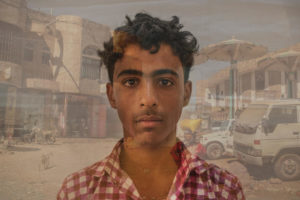
Hosam* said “We had dreams to have a nice house and live there. When the war started we had to flee our house due to the bombings. We saw three houses in our neighbourhood getting bombed on the same day. Our neighbours died inside their house. We saw a lot of old people getting killed just because they couldn’t escape the bombings. Our school was also bombed when we were on holidays. Half of the school was destroyed and there was no other school nearby. Neither me or my brother went to school after this.”
Hosam and his brother have been out of school since the beginning of the war. This of course hindered their learning, making them both unable to read or write. Through the intervention of a Save the Children case worker, Hosam was able to re-register in a public school and continue his education. His brother registered in vocational training.
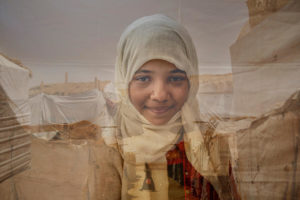
Bushra* is a 15 year-old girl from Hodeida, born with a medical condition, which prevents her from being able to walk. When the war started, an airstrike hit her school while children were inside. The school got damaged as warplanes flew above. Since schools were damaged and stopped operating, this left children like Bushra out of education. After fleeing to seek safety in other cities, Bushra and her family live in a makeshift shelter in a displacement camp. She now attends classes in a Save the Children temporary learning space within the camp. She was also given a wheelchair to help with her mobility.
Bushra said “It was three years ago when I was at school in Hodeida and an airstrike hit the neighbourhood of my school. The bomb exploded next to our school. Everyone was very scared and the school got damaged.”
Recently, the international donors failed to reach the funding goal of 3.85 billion USD during a Pledging Conference for Yemen. This could have devastating consequences for millions of children who rely on this support to survive. Currently over 11.3 million children rely on aid, and it is projected that over 2 million children could suffer from severe malnutrition this year. Though Canada did increase contributions from 2019, the amount was not significant enough to hit close to the intended target.
We need to continue supporting the children of Yemen.
*All names have been changed to protect privacy


